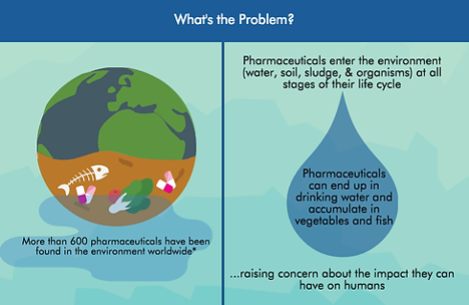
Robert, in collaboration with experts and the support of a Directed Studies student, developed a module titled “Pharmacists and the Environment,” where students learn about planetary health and climate change, healthcare systems impacts, and medication waste management.
In expanding students' understanding of the climate crisis and its impact on health, they are empowering future pharmacists to contribute to sustainable healthcare practices and advocate for positive change. With a Climate and Wellbeing Education Grant from the Sustainability Hub and the Office of Wellbeing Strategy, he is working on incorporating evaluation components into the course that look at climate change learning and student wellbeing.

Image Source: Canadian Association of Pharmacy for the Environment (CAPhe): https://www.caphe.ca/
National Collaboration for Planetary Health Education in Pharmacy
As a result of this work and recognizing the broader need for planetary health education in pharmacy curricula, Robert is embarking on a national collaboration with colleagues from different faculties of pharmacy across Canada. The Association of Faculties of Pharmacy of Canada has formed a Special Interest Group that will focus on, promote, and address key issues related to planetary health in pharmacy education. It will assist programs in addressing the current and future requirements of their curriculum, identifying core competencies related to planetary health, with the ultimate goal of thoughtful integration into education.
The group has over 20 faculty members involved and has representation from every Canadian professional pharmacy degree program. This step is vital to shaping future pharmacy professionals who can navigate the complex interplay of climate change and patient care.
Environmental Impact of Healthcare and Pharmaceutical Emissions
Healthcare systems significantly impact the environment, with approximately 5% of global greenhouse gas emissions being attributed to this industry (Watts et al., 2020). Among these emissions, approximately 25% are pharmaceutical-related, stemming from activities such as manufacturing, procurement and direct medication use (WEF: COP27 report, 2022). As the urgency to address climate change grows, many healthcare systems, governments, and institutions such as UBC have set ambitious goals for achieving net-zero emission healthcare systems, some as early as 2025. To meet these goals, it is crucial to implement robust mitigation and adaptation strategies within healthcare, including the integration of sustainable practices in pharmacy-related activities.
Integrating Planetary Health into Pharmacy Education
“There is increasing recognition of the need to formally incorporate planetary health content into pharmacy education to prepare future pharmacists for the environmental challenges they will face in their practice”, says Dr. Pammett. “By expanding students' understanding of the climate crisis and its impact on health, we are empowering future pharmacists to contribute to sustainable healthcare practices and advocate for positive change.

“Our project strives to cultivate a new generation of professionals equipped to address the urgent challenges posed by climate change in the pharmacy profession."
- Robert Pammett